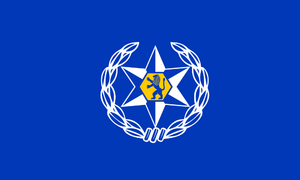Broken Knesset: Difference between revisions
No edit summary |
|||
| Line 10: | Line 10: | ||
===Radicalization of the Left=== | ===Radicalization of the Left=== | ||
{{main|Hezekian Reaction|Centrist Revolt||Gran Aligonian crisis (2019-present)}} | {{main|Hezekian Reaction|Centrist Revolt||Gran Aligonian crisis (2019-present)}} | ||
=== | ===Mutual distrust between Center and Left=== | ||
==Internal coalition clash over Knesset Majority Leader designate== | ==Internal coalition clash over Knesset Majority Leader designate== | ||
==Committee failures on key bills== | ==Committee failures on key bills== | ||
Latest revision as of 04:29, 4 December 2024
This article is incomplete because it is pending further input from participants, or it is a work-in-progress by one author. Please comment on this article's talk page to share your input, comments and questions. Note: To contribute to this article, you may need to seek help from the author(s) of this page. |

The so-called Broken Knesset, also known as the Do-Nothing Knesset or the Failed Spring Coalition Government, was an uneasy center-left coalition majority in the 51st session of the Royal Knesset of Yisrael. The signs of friction were evident even on Election Night of the 2024 general election, as the Joint Opposition nominee for presidency Gershon Kominsky fell narrowly short of defeating incumbent President Yitzchok Katz. As Katz secured re-election, District and MK seat results showed widespread losses among swing seats by the incumbent Right Bloc majority of the Conservatives, Torah Achdus, and Christian Voice. Later, the Alternative for Yisrael-led United Center Bloc and the National Liberal Party-led Left Bloc clashed over who to nominate as the Knesset Majority Leader. Furthermore, the legislative hiccups and delays through the committee system earned the governing Spring Coalition charges of being "ineffectual" and "broken" by all sides of the political system. Lastly, the sudden and chaotic Left-written Yarden Accords negotiation bill was decisively defeated on the Knesset floor, leading to the May 6 Knesset riot.
On May 7, 2024, His Majesty King Josiah IV in a public televised address invoked his royal reserve powers to suspend the Knesset, oust Oren Saddi as Majority Leader, and order new elections.
Origins of dysfunction
Radicalization of the Left
Mutual distrust between Center and Left
Internal coalition clash over Knesset Majority Leader designate
Committee failures on key bills
Failed Yarden Accords renegotiation bill
May 6 Knesset riot
End of the Broken Knesset by royal decree
In the aftermath of the May 6 Knesset riot, the Monarchy of Yisrael intervened. The next day after the riot, King Josiah IV gave a public televised address, the first of his reign, to react to the Knesset riot and the causes leading up to it. He asserted that, "The current Majority Leader, Oren Saddi, has failed our nation with his extraordinary failure as a political leader. While this alone would not necessarily warrant my intervention, and indeed if he was simply a weak politician, I would leave it to the voters at the next election or other regular political processes to handle this situation. His creation of a treasonous bill to fundamentally weaken our national security to expose our people to inherent danger from our enemies, foes, and others abroad who wish us harm, defeat, or death was a step too far [...]."
The King then announced he was ousting Saddi as Majority Leader, suspending the current Knesset, putting it under a caretaker staff for basic functions, and ordered new elections for the fall of 2024. He hinted at other Members of Knesset, who he called "factions" (implied to be Saddi supporters and allies in the National Liberals, Party of the Left, and parts of the Alternative for Yisrael) enabled the "treasonous" Yarden bill put forward by Saddi that sparked the May 6 riot. While he only blacklisted Saddi from public office, he all but encouraged, as his father did, Yisraeli voters to support alternatives to the liberal-left political alignment.
